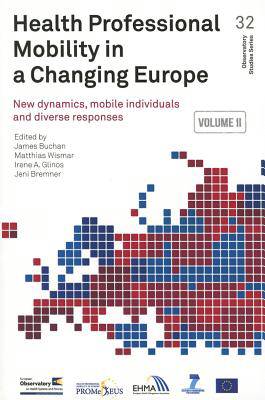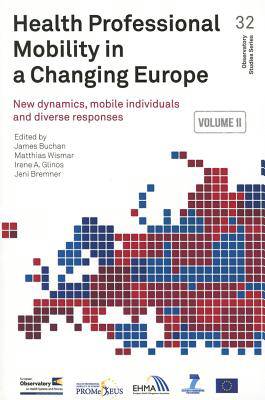
- Afhalen na 1 uur in een winkel met voorraad
- Gratis thuislevering in België vanaf € 30
- Ruim aanbod met 7 miljoen producten
- Afhalen na 1 uur in een winkel met voorraad
- Gratis thuislevering in België vanaf € 30
- Ruim aanbod met 7 miljoen producten
Zoeken
€ 109,95
+ 219 punten
Omschrijving
Health professional mobility in Europe has become a fast moving target for policy makers. It is evolving rapidly in direction and magnitude as a consequence of fundamental change caused by EU enlargement and the financial and economic crisis.
Health professional mobility changes the numbers of health professionals in countries and the skill-mix of the workforce, with consequences for health system performance. Countries must factor in mobility if they are forecasting and planning their workforce requirements. To this end they need clarity on mobility trends and the mobile workforce, and effective interventions for retaining domestic and integrating foreign-trained health workers. Health professional mobility remains an unfinished agenda in Europe, at a time when the repercussions of the financial crisis continue to impact on the European health workforce and its patterns of mobility.
This book sheds new light on health professional mobility in this changing Europe. It is the second volume of the PROMeTHEUS project, following the previously published country case study volume. The 14 thematic chapters in this book are grouped in three parts:
* The changing dynamics of health professional mobility
* The mobile individual
* Policy responses in a changing Europe
The book goes well beyond situation analysis as it presents practical tools such as a yardstick for registry methodology, a typology of mobile individuals, qualitative tools for studying the motivation of the workforce and a set of concrete policy responses at EU, national and organizational level including bi-lateral agreements, codes and workplace responses.
Health professional mobility changes the numbers of health professionals in countries and the skill-mix of the workforce, with consequences for health system performance. Countries must factor in mobility if they are forecasting and planning their workforce requirements. To this end they need clarity on mobility trends and the mobile workforce, and effective interventions for retaining domestic and integrating foreign-trained health workers. Health professional mobility remains an unfinished agenda in Europe, at a time when the repercussions of the financial crisis continue to impact on the European health workforce and its patterns of mobility.
This book sheds new light on health professional mobility in this changing Europe. It is the second volume of the PROMeTHEUS project, following the previously published country case study volume. The 14 thematic chapters in this book are grouped in three parts:
* The changing dynamics of health professional mobility
* The mobile individual
* Policy responses in a changing Europe
The book goes well beyond situation analysis as it presents practical tools such as a yardstick for registry methodology, a typology of mobile individuals, qualitative tools for studying the motivation of the workforce and a set of concrete policy responses at EU, national and organizational level including bi-lateral agreements, codes and workplace responses.
Specificaties
Betrokkenen
- Auteur(s):
- Uitgeverij:
Inhoud
- Aantal bladzijden:
- 396
- Taal:
- Engels
Eigenschappen
- Productcode (EAN):
- 9789289050258
- Verschijningsdatum:
- 5/12/2014
- Uitvoering:
- Paperback
- Formaat:
- Trade paperback (VS)
- Afmetingen:
- 160 mm x 236 mm
- Gewicht:
- 884 g

Alleen bij Standaard Boekhandel
+ 219 punten op je klantenkaart van Standaard Boekhandel
Beoordelingen
We publiceren alleen reviews die voldoen aan de voorwaarden voor reviews. Bekijk onze voorwaarden voor reviews.







